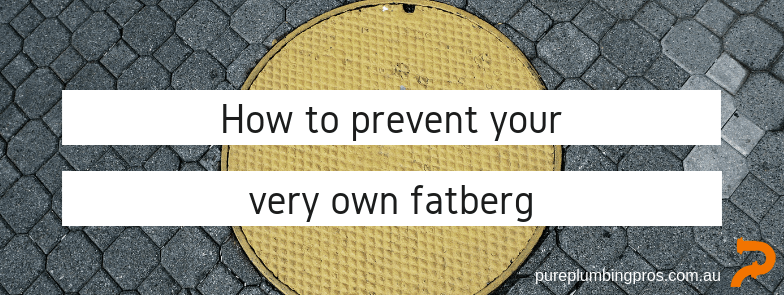How to prevent your very own Fatberg

You may have seen an article in the media lately about a gigantic fatberg discovered in a drain in the south of England. The 64-metre long mass made of grease, fat, oil, food scraps, rubbish and sewage is clogging up a drain in the pretty seaside town of Sidmouth, Devon.
Authorities think that it probably only took a couple of years for this mammoth, stinking slimeball to accumulate. That’s a huge task for a small town about the size of Lithgow. It’s expected to take workers weeks to carry out the unenviable task of removing the now quite solid lump of putrid gunk using shovels, pickaxes, high-pressure water jetters and breathing apparatus.
Thankfully our drainage specialists don’t come up against drain blockages of this scale, however, this giant problem is not exclusive to quaint holiday towns in the UK. Every city, town, council across the world with a plumbing system battles this issue every year to a varying extent.
The cost of keeping the plumbing system in Sydney running freely would run into the millions each year. An expense that eventually trickles down from councils and water authorities to residents themselves.
How do fatbergs occur?
Fatbergs are a gradual build-up of everything households wash down the drain which should go in the rubbish bin instead. Things like:
- Oil, fat, grease
- Food scraps
- Wet wipes
- Sanitary items
- Nappies
- Cotton buds
Of course, the stuff that is actually supposed to go down the sewer is also stuck in there as well, to help with the delightful aroma.
Individual homes are not exempt from the fatberg, the smaller size of domestic drains means they are even more susceptible to blockages.
How to prevent fatbergs in your plumbing system?
The seriously frustrating part is the problem is totally preventable. All it takes is a change in the way we treat our drain systems.
Stop thinking of the drain in your sink or the bowl of your toilet as a rubbish bin. As a general rule, with the exception of toilet paper, if it didn’t come out of you don’t put it in the loo.
From your dearly departed goldfish or the leftover scrambled eggs to out-of-date medication and so-called ‘flushable’ wet wipes, throw them all in the rubbish bin rather than down the drain. (Actually, you can take old medication to any chemist to dispose of correctly.)
Start today, teach your family, tell your friends, post it on Facebook, Instagram, or Pinterest. Just do it.
Here’s a handy infographic on the dos and don’ts of preventing clogged drains to help you remember.

Need help clearing your very own fatberg? Pure Plumbing Professionals team drain clearing and cleaning specialists call today.
